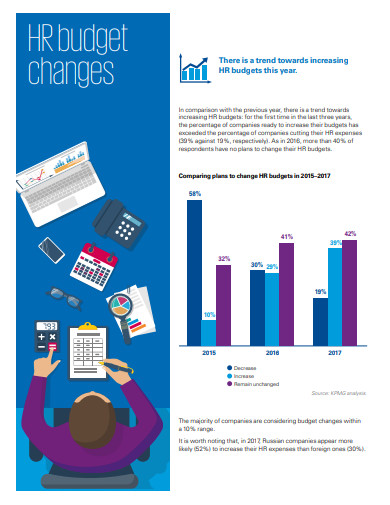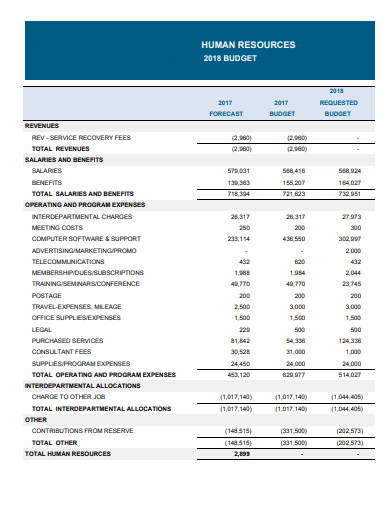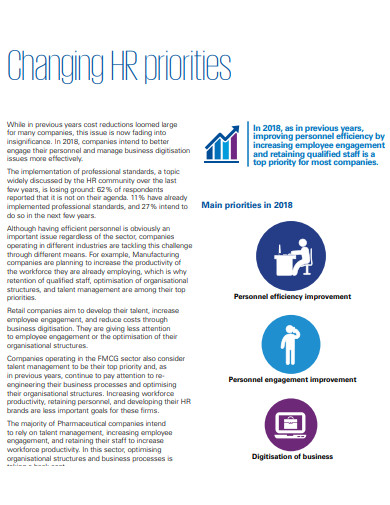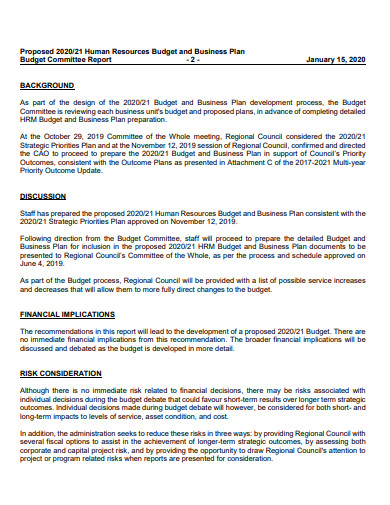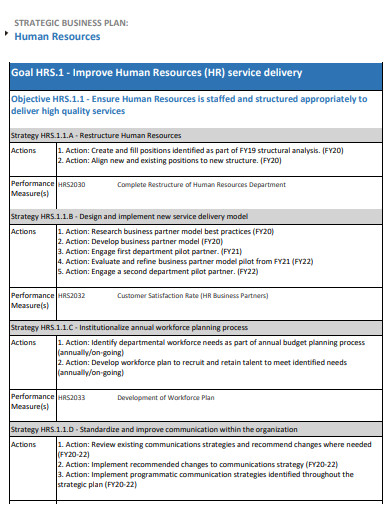During a business plan meeting, companies often allocate budget per department. Corporate budgeting is the process by which a business estimates its finances for a future period and plans its operations accordingly. In developing a corporate budget, a business usually starts with a project plan, then determines the amount of time, goals and costs of the project. And the HR department is no exception to this. Budgeting requires the collection of many forms of data and objectives. That will allow departments to concentrate their allotted budgets in supporting those objectives. In order to acquire the approval from overall management, then it is important for the departments to create a budget plan. In this article, let us discuss more about HR budget plan and for free templates check out our free HR budget plan samples below:
5+ HR Budget Plan Samples
1. HR Budget Plan
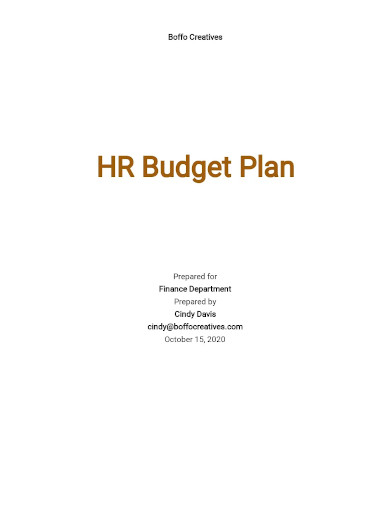
2. Sample HR Budget Plan
3. HR Business Budget Plan
4. Simple HR Budget Plan
5. Sample HR Business Budget Plan
6. HR Business Strategic Budget Plan
What Is an HR Budget Plan?
In simple terms, budgeting is creating a plan on how to use and spend your money. From an ordinary household to big corporate businesses, budgeting helps everyone control their spending, track your expenses, and save more money. Additionally, budgeting can help you make better financial decisions, prepare for emergencies, get out of debt, and stay focused on your long-term financial goals. And as equally important as other departments in an organization, the HR department too need their own HR budget plan. This would refers to the funds that HR allocates to all HR processes enterprise-wide. The HR budget will include funds allocated to hiring, salaries, benefits, talent management, training, succession planning, workforce engagement, and employee wellness planning and other relevant matters that involves a company’s manpower asset.
How To Compose an HR Budget Plan?
An HR Budget cannot be fully formulated without the help of other departments in an organization. This is because, HR budgeting use financial information, performance results and historical data from every department. Since the HR budget considers HR activities company-wide, it is an incredibly complex yet essential document to determining a company’s future HR activities. Working on a HR budget plan does not have a designated format, as each company would have their own. But here are the most common elements included in a budget planning:
- Training and development : this may include employee trainings, external programs, business travel expenses, workshops and conferences and etc.
- Recruitment: sourcing out for new employees can lead to cost such as job posting and advertising, employee relocation, interview, trainings and many more.
- Employee compensation and benefits: salaries, medical benefits, overtime pay, recognition and awards program, retirement funding, commuting or telecommuting expenses and etc.
- Miscellaneous: charities, intranet design and maintenance, administrative expenses.
In an HR budget plan, some companies would include a comprehensive set of data with numbers and cross reference information from other sources. Nevertheless, HR budgets are highly unique to a company’s strategic direction. However a company creates their HR budget plan, most HR budgets will involve the following steps:
I. Review of Past Budgets
When it is time to start budgeting, one important data used are previous budgets and the strategic plan. By comparing these data, you can then determine and establish goals and identify capital expenditures based on historical performance.
II. Determine Your Budgeting Strategy
Each company has their own strategic approach when it comes to budgeting their money and expenses. So it is important to stick to budgeting strategy that works well with your department, if any previous strategies didn’t work too well and has created problems, then while you are at the budget planning stage then it is the best time to brainstorm amongst your team a new budgeting strategy approach.
III. Performance Evaluation
For a more better perspective, it is suggested to analyze HR performance data and budget actuals as they are in real-time. This analysis should include revenue, both departmental and organizational expenses, staffing (recruiting, hiring, turn-over), and employee compensation. With this the HR team can better evaluate what needs to be updated, revised or added in their budget plan.
IV. The Affects of Finance in Operations
By analyzing the financial performance while in operations will help give your team an overview of how this would impact not just your team but the organization as a whole. This will give you an insight on how to set more realistic budget caps and an understanding where you can build flexibility into your budget.
FAQs
What Are the Benefits of Business Budgeting?
Aside from saving money, businesses are able to allocate appropriate resources to projects, plan better for the future of the company, helps in monitoring performance and improve decision-making.
What Is the One Important Thing to Consider for HR Budget Planning?
Employee salary and wages are a top priority in HR budget planning, since this is one of the biggest cost or expenses, so it requires careful review.
What Are the Purpose of Business Budgets?
This is to anticipate sources and amounts of income for a business. And predict the types and amounts of expenses for a specific business activity or the entire business.
A well-planned and thoughtful budget plan would help ensure that HR department receives the necessary funding to support employee programs and initiatives critical to attracting and retaining a skilled workforce.
Related Posts
FREE 9+ 30-Day Marketing Plan Samples in PDF | MS Word | Apple Pages | Google Docs
FREE 3+ Sales Team Action Plan Samples in PDF | MS Word | Apple Pages | Google Docs
Marketing Plan For Small Business Samples
FREE 7+ Fashion Business Plan Samples in PDF
FREE 10+ Sprint Planning Samples In MS Word | Google Docs | PDF
FREE 10+ Wedding Planning Samples in MS Word | Apple Pages | Powerpoint | PDF
FREE 9+ Monthly Study Planner Samples in PSD | Illustrator | InDesign | PDF
FREE 9+ Sample Curriculum Planning Templates in PDF | MS Word
FREE 10+ Teacher Development Plan Samples in MS Word | Google Docs | Apple Pages | PDF
FREE 10+ Basketball Practice Plan Samples in PDF
FREE 12+ School Business Plan Samples in PDF | MS Word | Apple Pages | Google Docs
FREE 7+ Client Strategic Plan Samples in PDF | MS Word
FREE 11+ Trucking Business Plan Templates in PDF | MS Word | Google Docs | Pages
FREE 7+ Small Hotel Business Plan Samples PDF | MS Word | Apple Pages | Google Docs
FREE 14+ Bakery Business Plans in MS Word | PDF | Google Docs | Pages

